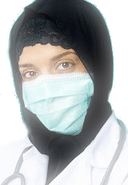Get the App
For Doctors
Login/Sign-up
Last Updated: Aug 29, 2019
BookMark
Report
Sleep is very important for our health and lack of sleep can affect our whole immune system.
Dr. Sumaiya PetiwalaDietitian/Nutritionist • 18 Years Exp.Certified Diabetes Educator, Registered Dietitian (RD), PGDD, Bachelor of Unani Medicine and Surgery (B.U.M.S), General Physician
Our body's biological clock is set for 24-hour rhythm and certain periods of light and darkness (a circadian rhythm), and when it's thrown off, so is the immune system.
Regular poor sleep or prolonged lack of sleep can disrupt your body's natural immune system and can lead to many illnesses such as infections (such as cold/flu) and increasing risk of serious medical conditions such as obesity, heart disease, diabetes as well as it can shortens your life expectancy. So every time when you catch cold and flu, you could blame your bedtime.
Therefore when planning your activities and rest, you should consider around 8 hours of good quality sleep a night to function properly (some of us need more or less time).
Why lack of sleep is bad for your health?
If you have a disturbed sleep patterns you can have nap during the day when you get tired, it helps a lot. The benefits of napping could be best obtained by training the body and mind to awaken after a short nap. Naps of fewer than 30 minutes restore wakefulness and promotes performance and learning
Nutrition and diet
Our immune system requires ingestion and absorption of vitamins, minerals, and food energy in the form of carbohydrates, proteins, and fats. Foods rich in certain fatty acids (such as conjugated linoleic acid, catalpic acid, eleostearic acid and punicic acid) may boost your healthy immune system by providing additional energy. The amount and type of carbohydrates consumed is also important so intake isn't too much (overnutrition) or too less (malnutrition).
Drink less alcohol
Regular drinking can affect your immune system and heavy drinkers tend to catch more infectious diseases. If you cut down on alcohol before bedtime, you'll get a better night's rest and have more energy next day.
Cut out caffeine
If you find that not consuming caffeine gives you headaches, you should cut down on the amount of caffeine. The royal college of psychiatrists recommends that anyone feeling tired should cut out caffeine.
Drink more water for better energy
Sometimes we feel tired, because we're mildly dehydrated, so glass of water can help (especially after exercise).
Source: NHS
Regular poor sleep or prolonged lack of sleep can disrupt your body's natural immune system and can lead to many illnesses such as infections (such as cold/flu) and increasing risk of serious medical conditions such as obesity, heart disease, diabetes as well as it can shortens your life expectancy. So every time when you catch cold and flu, you could blame your bedtime.
Therefore when planning your activities and rest, you should consider around 8 hours of good quality sleep a night to function properly (some of us need more or less time).
Why lack of sleep is bad for your health?
If you have a disturbed sleep patterns you can have nap during the day when you get tired, it helps a lot. The benefits of napping could be best obtained by training the body and mind to awaken after a short nap. Naps of fewer than 30 minutes restore wakefulness and promotes performance and learning
Nutrition and diet
Our immune system requires ingestion and absorption of vitamins, minerals, and food energy in the form of carbohydrates, proteins, and fats. Foods rich in certain fatty acids (such as conjugated linoleic acid, catalpic acid, eleostearic acid and punicic acid) may boost your healthy immune system by providing additional energy. The amount and type of carbohydrates consumed is also important so intake isn't too much (overnutrition) or too less (malnutrition).
Drink less alcohol
Regular drinking can affect your immune system and heavy drinkers tend to catch more infectious diseases. If you cut down on alcohol before bedtime, you'll get a better night's rest and have more energy next day.
Cut out caffeine
If you find that not consuming caffeine gives you headaches, you should cut down on the amount of caffeine. The royal college of psychiatrists recommends that anyone feeling tired should cut out caffeine.
Drink more water for better energy
Sometimes we feel tired, because we're mildly dehydrated, so glass of water can help (especially after exercise).
Source: NHS



+1.svg)
